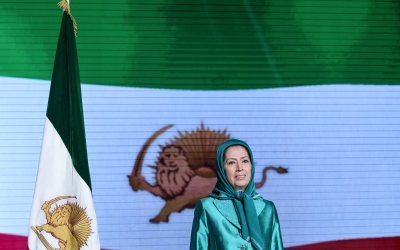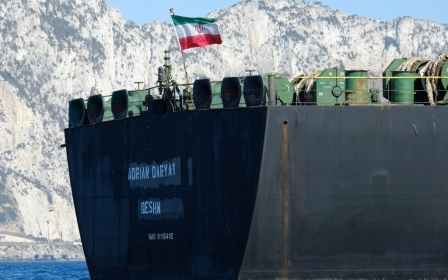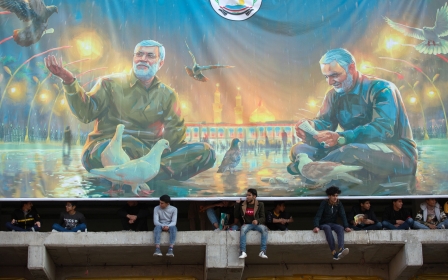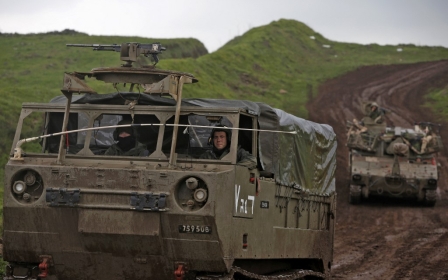Biden's Iran envoy says Trump's maximum pressure campaign was a failure

The US envoy for Iran has reaffirmed the intention of President Joe Biden's administration to revive the 2015 nuclear deal, and slammed former President Donald Trump's maximum pressure campaign of sanctions against Tehran, calling it a "failure".
Speaking to BBC Persian on Wednesday, Rob Malley called on Iran to engage in dialogue with the US and take steps to restart the nuclear accord known as the Joint Comprehensive Plan of Action (JCPOA).
With a return to the agreement stalling, as each side argues the other should return to full compliance first, Malley said talks were needed to map out the reimplementation of the deal.
"We can play games about who goes first. I think anyone who's dealt with this knows that neither side is going to go first entirely," Malley said.
"There's going to have to be some agreement on choreographing, on synchronising. We're open to discussing that, but it's going to have to be discussed. It's not going to happen simply unilaterally by one side taking all the steps and waiting."
'Thing of the past'
The JCPOA, signed in 2015, saw Iran scale back its nuclear programme in exchange for lifting sanctions against its economy.
In 2018, Trump nixed the agreement and began piling sanctions onto a variety of Iranian industries, businesses and individuals.
In response, Iran has been downgrading its commitments to the deal and enriching uranium beyond agreed limits, shortening the time it would need to amass fissile material were it to build a nuclear weapon.
The Biden administration has said it seeks a return to the agreement, but the rival sides have not been able to work out a sequence to return to mutual compliance with the accord.
Despite continuing to enforce Trump's sanctions, Malley said Biden's approach to Iran was nothing like his predecessor.
"President Biden and all of his senior advisers have said this - the maximum pressure campaign has failed. It was a failure, a predicted failure," Malley said.
"It hasn't made life any better for the Iranian people; it hasn't made life any better for the US and the region; it hasn't brought us any closer to this better deal that President Trump spoke about."
He added that the new administration wanted to "turn the page" on the maximum pressure campaign, and make it a "thing of the past".
Washington has expressed willingness to meet with the Iranians to iron out the details about reviving the deal, after a European invite for an informal meeting of the original signatories of the JCPOA, which include Germany, the UK, France, Russia and China. But Tehran has, as yet, declined to engage in talks.
Invite to talks
In the BBC interview, Malley stressed the need for negotiations to save the nuclear deal, offering to hold talks through a third party if Iranian officials did not want to sit down with the US.
"I've spent my life saying it's not a favour for the US to sit down with others," the US envoy said.
"It's not a favour that Iran is giving to us to sit down with us. It's something that we do because it's in our mutual interest to get to the point where we could achieve that result of coming back to the position that we want to get into where both sides are in compliance with the deal."
The appointment of Malley, a veteran diplomat who helped negotiate the 2015 agreement, faced opposition earlier this year from Iran hawks who view him as too soft on Tehran.
The US administration is facing domestic pressure from Republicans and Democrats in Congress to expand the deal to tackle Iran's ballistic missile programme and regional activities - issues that Tehran has said are not up for discussion.
On Wednesday, Malley reiterated the administration's position that, after reviving the JCPOA, Washington will seek follow-on negotiations to make the deal longer and stronger and use it as a platform to address broader issues with Tehtan.
But in a rare American acknowledgement of Washington's adversaries' calculations, he said Tehran would also raise its own set of demands in future talks.
"We suspect that they have issues that Iran is going to want to bring to the table that are going to be important for their interest, but that discussion should take place," Malley said.
Middle East Eye propose une couverture et une analyse indépendantes et incomparables du Moyen-Orient, de l’Afrique du Nord et d’autres régions du monde. Pour en savoir plus sur la reprise de ce contenu et les frais qui s’appliquent, veuillez remplir ce formulaire [en anglais]. Pour en savoir plus sur MEE, cliquez ici [en anglais].





